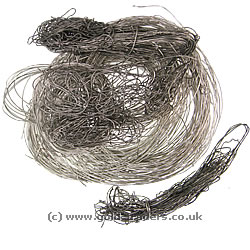
Platinum thermocouple wire
A thermocouple is quite simply a sensor for measuring temperature, with many applications from central heating boilers to jet engines. Thermocouples use the reaction of two dissimilar metals to measure temperature variation. The types of metal involved vary according to the temperature range in which the thermocouple operates.
Some thermocouples use relatively inexpensive alloys such as nickel, chrome, iron and aluminium. The thermocouples we’re interested in, known as Types B, R and S, use platinum – a rare and expensive material that is one of the noble metals (which also include silver and gold).
Platinum, rare and valuable
Platinum has the chemical symbol Pt and the atomic number 78, and is twice the density of silver. One of the rarest elements on Earth and extremely valuable, it is mined mostly in South Africa. As an indication of its value, the crown worn by Queen Elizabeth the Queen Mother, as Consort of King George VI, had a frame made of platinum. Though the crown was undoubtedly spectacular, the platinum frame added significantly to its weight; a solid six inch cube of platinum weighs as much as an adult man.
We don’t expect you to send us the Queen Mother’s crown for valuation! However, though the platinum wire used in thermocouples is a relatively small diameter, its value makes it well worth selling to Gold-Traders.
Platinum qualities
Why platinum? It cannot be oxidised, withstands most acids, has high resistance to corrosion and high temperatures, and is electrically stable and an efficient conductor. In thermocouples, platinum is often combined in an alloy with rhodium, a chemically inert transition metal which is also part of the platinum group.
Types of platinum thermocouple
The ratio of platinum to rhodium depends on the type of thermocouple.
Type B Thermocouple Wire
For a Type B thermocouple, one conductor will be 70% platinum, 30% rhodium, while the other will be 94% platinum, 6% rhodium. Type B thermocouples are used for very high temperature measurements, with a usable range of around 800°C to 1800°C.
Type R Thermocouple Wire
A Type R thermocouple will have one conductor with 87% platinum, 13% rhodium, and the other conductor 100% pure platinum. It’s used for temperatures up to 1600°C, in applications such as the steel industry.
Type S Thermocouple Wire
The Type S thermocouple can also withstand heat up to 1600°C, and has one conductor that’s 90%, 10% platinum and the other 100% pure platinum. A typical application for Type S is providing the calibration standard for the melting point of gold (1064.43°C). It’s also used in pharmaceutical and biotechnology applications.
Scrap Thermocouple Prices
- Type B: £ (70% conductor) & £ (94% conductor)
- Type R: £ (87% conductor) & £ (100% conductor)
- Type S: £ (90% conductor) & £ (100% conductor)
Selling Thermocouple Wire
Unlike other dealers, the prices we quote are the prices we pay. We have no hidden deductions and don’t charge testing or refining fees.
To sell your thermocouple wire, please complete our claim form. Once submitted, you’ll be asked to print a copy for signing and we’ll give you full instruction regarding packaging and postage. All packages are dealt with on the day of receipt, Monday to Friday. If you have any other questions, please feel free to give us a call to discuss.

